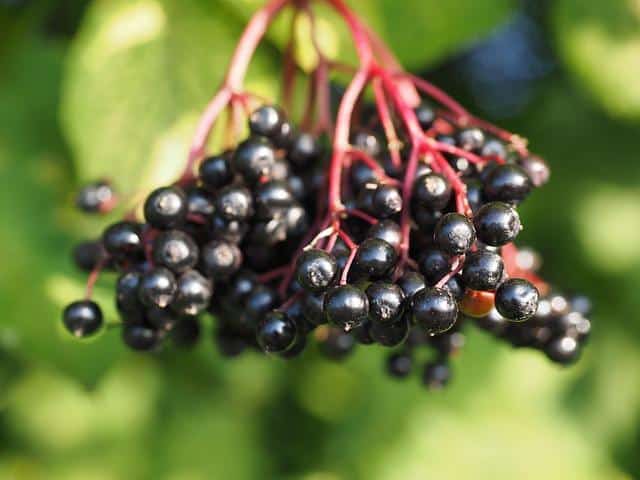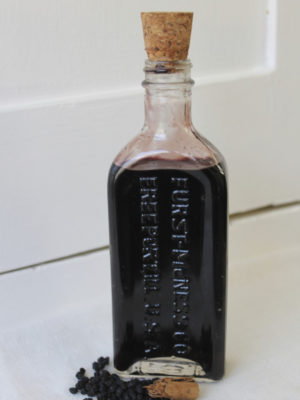The common cold and the flu have been around for a long time. Today, people use preventative measures as well as over-the-counter remedies to stay healthy, but what did our ancestors do before pharmacies and modern medicines were commonplace?
One of the most commonly used flu and cold remedies was elderberries. In fact, it’s still used in medicines today. You can buy elderberry-based cough syrups, which have been proven to reduce the severity of the common cold or flu, in your local pharmacy.
How Can Elderberries Help?
Elderberries (Sambucus nigra), which are native to a few parts of Europe and the US, come from a flower bush that produces small, black/purple fruits, similar to mulberries. They taste something like a strong blackberry.
Please note that the leaves of elderberry bushes can be poisonous, so don’t eat them or use them for tea. Elderberries need to be cooked prior to use or they can cause intense vomiting and diarrhea.
This highly prized… premium purple powder… belongs in your “just in case” medicine cabinet.
Numerous studies back up claims that the elderberry contains anti-viral compounds, which prevent you from becoming infected in the first place – and shorten the duration and severity of the illness when you do get sick.
Grow Your Own
Order an elderberry bush from a reputable nursery and be certain you are getting Sambucus nigra.
One of the great things about elderberry bushes is that they are very easy to grow. They tolerate poor soil and very wet soil. However, one thing that elderberry bushes love is water. If you have hot, dry summers, you will need to give these little beauties water on a weekly basis.
If you want to plant more than one, put them about 3 feet apart, in rows about 12 feet apart. You should plant at least two bushes (for cross-pollination). For best results, do nothing to the plants for the first two years. Do not prune them and do not remove the berries. Just let them be their own wild selves for a short time, and then you can prune them and use the berries as you wish. Prune in the early spring and remove dead branches.
They will just give a few berries their very first year, but by the second year, you will have plenty. Berries ripen somewhere between the middle of August and the middle of September, which gives you just enough time to mix up some elderberry syrup!
Elderberries Have Roughly 5 Times As Many Anthocyanins As Blueberries!
How to Make Your Own Elderberry Syrup
Of course, people use elderberries for things other than cold medicine. There are recipes for elderberry wine, elderberry “marshmallows” and even elderberry pie. Today, however, we are going to look at a quick and easy way to make elderberry syrup.
There are probably as many recipes for this syrup as there are for meatloaf. This one is very basic and simple, but gets the job done. Tastes pretty good, too!
Ingredients:
- 1 cup of dried elderberries or 1.5 cups of fresh berries
- 5 cups of water
- 2 tablespoons of ginger
- 1 teaspoon of cinnamon
- ½ teaspoon of clove powder
- 1 cup of honey
- 16-ounce glass container with lid (Mason jars are a good choice)
Instructions:
- In a medium-sized pot, add all ingredients except for the honey
- Bring to a boil, and then cover.
- Reduce heat to simmer
- Allow to simmer for at least 45 minutes or until the liquid is reduced to about half
- Remove from heat and allow to cool until lukewarm
- Mash the berries a bit, and then strain from pot into a bowl
- Add honey and mix well
- Pour into container of your choice
A standard dose is 1 teaspoon for children 12 and under every 3 to 4 hours. Adults can take 1 tablespoon every 3 to 4 hours.
Some people recommend giving children 1 teaspoon each day (and adults 1 tablespoon) during the flu season for preventative measures, but this is a matter of choice, as there are no studies showing this will prevent you from catching a cold or flu. That being said, it certainly wouldn’t hurt anything if you decided to try it!
This syrup is best when stored in the refrigerator and will last for several months. You can also freeze it in ice cube trays, and then seal them in plastic bags for later use. Elderberries also can be frozen if you want to make fresh batches during the winter months.
Have you ever consumed elderberries to boost your health? What advice would you add? Share your tips in the section below:




























